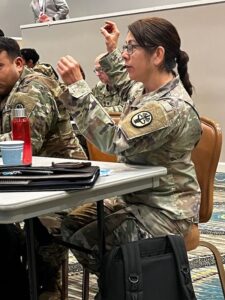FORT BELVOIR, Va.- The Army Recovery Care Program (ARCP) is a beacon of security for Soldiers and their families. While most Soldiers may not be aware of its existence, the Soldier Recovery Units (SRUs) within ARCP stand ready, like a safety net, should a Soldier need them, providing a sense of reassurance and support.
Since 2007, ARCP has helped thousands of wounded, ill, or injured Soldiers recover and overcome through managed care that focuses on returning to duty or setting them up for success should they medically retire. During the 2024 Leadership Summit at Fort Belvoir, the fourteen SRU Commanders came together and shared best practices.
Lt. Col. Evelyn Macias, a former Nurse Case Manager at the Joint Base Lewis McChord SRU and now the Deputy RCO of MRC West, explained the value of meetings like this, mainly where change usually occurs. “They are coming to us; we need to execute the expectation of caring for Soldiers. Change is something you hope is better. You hope you are making it better. Communication is key at events like this. We are working together to make a better outcome. Change is challenging but we are working it for our Soldiers.” The change she speaks of ranges from the processing of a Soldier into an SRU to the managed care itself and everything in between.
Serving as an SRU Commander at Ft. Stewart, Georgia, has been the highlight of Lt. Col. Jody Wright’s career, and he explained how he hopes others after him will embrace the program so carefully built to help our Soldiers. He says knowledge of the program and working in it changed his life. “When I got selected for a command, I didn’t know what an SRU was. I feel like being the commander of the SRU has been paramount in my career because it developed me as a person, leader, and officer. It helped me with the empathy required to care for Soldiers. It’s different when you are in a combat unit; I’ve been in combat organizations my entire career, and everyone is like, get after it, don’t complain, make it happen. What you don’t see is the reverse of those deployments, meaning you don’t see the recovery; you don’t see the true injury, yes we see the impact when we are deployed, but now we see the other side at the SRU getting to know the Soldier and their family and understanding the loss that the Soldier and their family feels at the point of the injury.”
The myth that an SRU is just for war injuries is part of the ongoing education within the Army Recovery Care Program. Lt. Col. Wright, a testament to the program’s success, emphasizes the sense of camaraderie and shared mission within the SRU. He says, “Being at the SRU, you see the other half; you see the dedication and motivation of these Soldiers who want to get back to the line. You see these Soldiers wanting to give back to their battle buddies. They don’t want to let them down, so they want to get back.” This sense of community and shared purpose is a cornerstone of the ARCP.
The mission is to Help Soldiers get back to the fight or back to a productive life with their families. Macias says that as a leader in the program, she wants to take opportunities like the annual summit to do it even better! “I want to become more of an expert in this and the areas I feel I don’t know enough. Patient movement is a big deal; I want to know more.”
According to Wright, knowing more, sharing best practices, and implementing positive change is a win-win for Soldiers, their families, and the Army. “We are probably the only organization that gives readiness back to the Army. Most people who come to the SRU are counted out, but we know, as the command team, that we can help them get back. And we are giving back to the Army.
